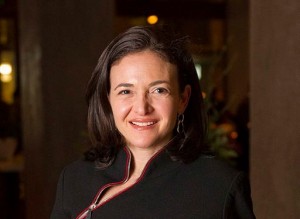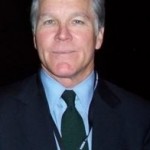 Facebook Inc.’s Chief Operating Officer Sheryl Sandberg recently spoke at the World Economic Forum in Davos, Switzerland and related important ideas about women in the workplace. She said we need to be mindful of how we’re socializing boys and girls at home, and called on chief executives to implement equal maternity and paternity leave policies.
Facebook Inc.’s Chief Operating Officer Sheryl Sandberg recently spoke at the World Economic Forum in Davos, Switzerland and related important ideas about women in the workplace. She said we need to be mindful of how we’re socializing boys and girls at home, and called on chief executives to implement equal maternity and paternity leave policies.
Great stuff, right? And yet we’re totally disappointed in her.
Facebook recently filed for an initial public offering (IPO) that’s expected to raise up to $10bn this spring, and which could compensate Sandberg $1.6bn, solidifying her place among the most powerful executives in America.
Because of her newfound perch at the top, when she speaks about her professional trajectory and gender equality, it’s time she acknowledges the full range of dynamics that have helped her get there.
What dynamics?
That her Whiteness has played a role in her success.
Ay, that was hard to write. And we don’t mean to target the newest billionaire simply because she’s a woman. We’re critical of representations of White male leadership, too.
Sandberg’s story goes like this: She was an economist at the World Bank after completing her formal education. From there she became the chief of staff for Lawrence Summers, the Treasury Secretary and her former professor and thesis adviser. Then came a prominent post at Google, which led her to Facebook in 2008. It’s clear that she follows what she advised the graduates of Barnard College last year, “Put your foot on that gas pedal and keep it there.”
We need help in talking about the sensitive issues of racial dynamics at work; we’ll gratefully consult the work of Columbia University professor Sarah Brazaitis.
In a chapter called “White Women–Protectors of the Status Quo; Positioned to Disrupt It” in the book Group Relations Reader 3: Group Dynamics, Organizational Irrationality, and Social Complexity, Brazaitis looks at how White women acquire unearned privilege and authority through their Whiteness and their relationships with White men.
We think of Sandberg as Brazaitis writes:
White women are in a position of being vulnerable to oppression based on their gender and capable of oppression based on their race.
Brazaitis goes deeper:
White women have historically focused on their gender oppression largely to the exclusion of their race privilege. The field of psychology… has ignored White women’s Whiteness and only examined the impact of race when women of color are included in a sample. Thus, the psychology of women in large part has neglected the differentiation among women and instead, has presented theories and studies that suggest there is a “universal woman.” This concept of the universal woman implies that gender is a primary experience for all women and that differences among women such as race, ethnicity, class, religion, sexual orientation, and so on are secondary to the female experience. Yet, femaleness varies across a wide variety of social identities. When White women refuse to acknowledge this variation, along with accompanying status and power differences… it is increasingly difficult for them to work authentically.
That’s a long quotation, and worth every character space. The Facebook COO is totally not alone in ignoring her race privilege and seeing all women as the race-less “universal woman” presented in psychology texts. It’s certainly challenging to be aware of how race, ethnicity, gender, religion, ability and sexual orientation can influence our professional development. If it were easy, we’d have little to write about on this blog!
And did you note the cost of turning away from discussing White privilege? It’s a big one: personal authenticity. We can’t be our authentic selves when we’re less willing to consider the impact of our gender and our race on who we are and how we work.
So what didn’t Sheryl Sandberg say at Davos? Catch this:
“I have White privilege. By linking with the authority of powerful White men, I’ve had access to roles in prestigious institutions and I’ve excelled. Yet this privilege costs me too. It stifles my creativity and complexity and confines me to narrow, rigid, unauthentic and unearned definitions of myself and my roles. The authority I have is not wholly based on who I am, but rather on the pink undertone of my skin, my fine hair, narrow nose and thin lips. It’s grossly unfair, and irrational. I no longer want to benefit from these things that I can’t change. By opening up to you about these dynamics, I hope we’ll continue talking about and working across the differences we see with others. In the end, only by working across our differences will we find a level working field and collaborate to solve some of the greatest problems facing us.”
Imagine it! Adapted from Brazaitis’s chapter, this is the type of language Sandberg could use to talk broadly, deeply–and authentically–about her professional development, and open the eyes of so many. Brazaitis counts many more benefits of coming forth with the above self-analysis:
White women who acknowledge their femaleness and their Whiteness potentially bring more authenticity and passion to their work, love, and lives in general. Hence, they are harder for others to categorize, understand, and sometimes, appreciate… Yet they may be more sure of their own authentic competence and true value irrespective of skin color, and hence, more resistant to others’ assaults.
Perhaps ironically, Sheryl Sandberg was the first inductee into the Whole Wide Work Hall of Fame. We still stand by her award, because she’s been earnest in encouraging us to bring our full selves to work. We can tolerate our ambivalence, so we also remain firm in our criticism of what she’s been leaving out of her speeches. We feel a little bad, since we’re not the only ones to give Facebook’s COO grief.
If Sandberg wants to profoundly help women, she should heed her own words, bring her full self to her speeches, and talk about her gender, Whiteness, and White privilege relative to her career path.
Watch Sheryl Sandberg speak at the World Economic Forum, starting at about 24:20:
Image via




Pingback: Yes, Gender Impacts Journalism | Whole Wide Work